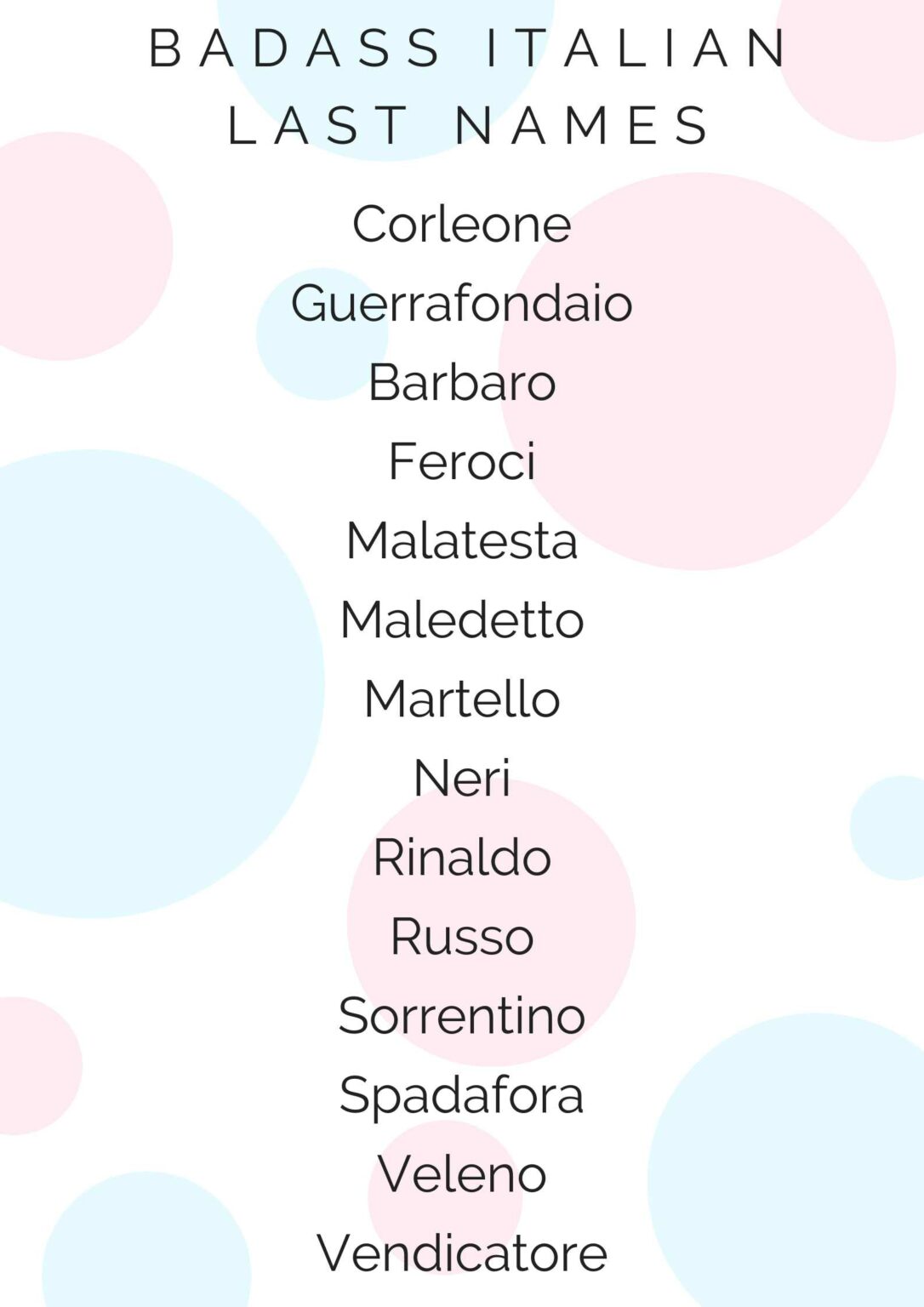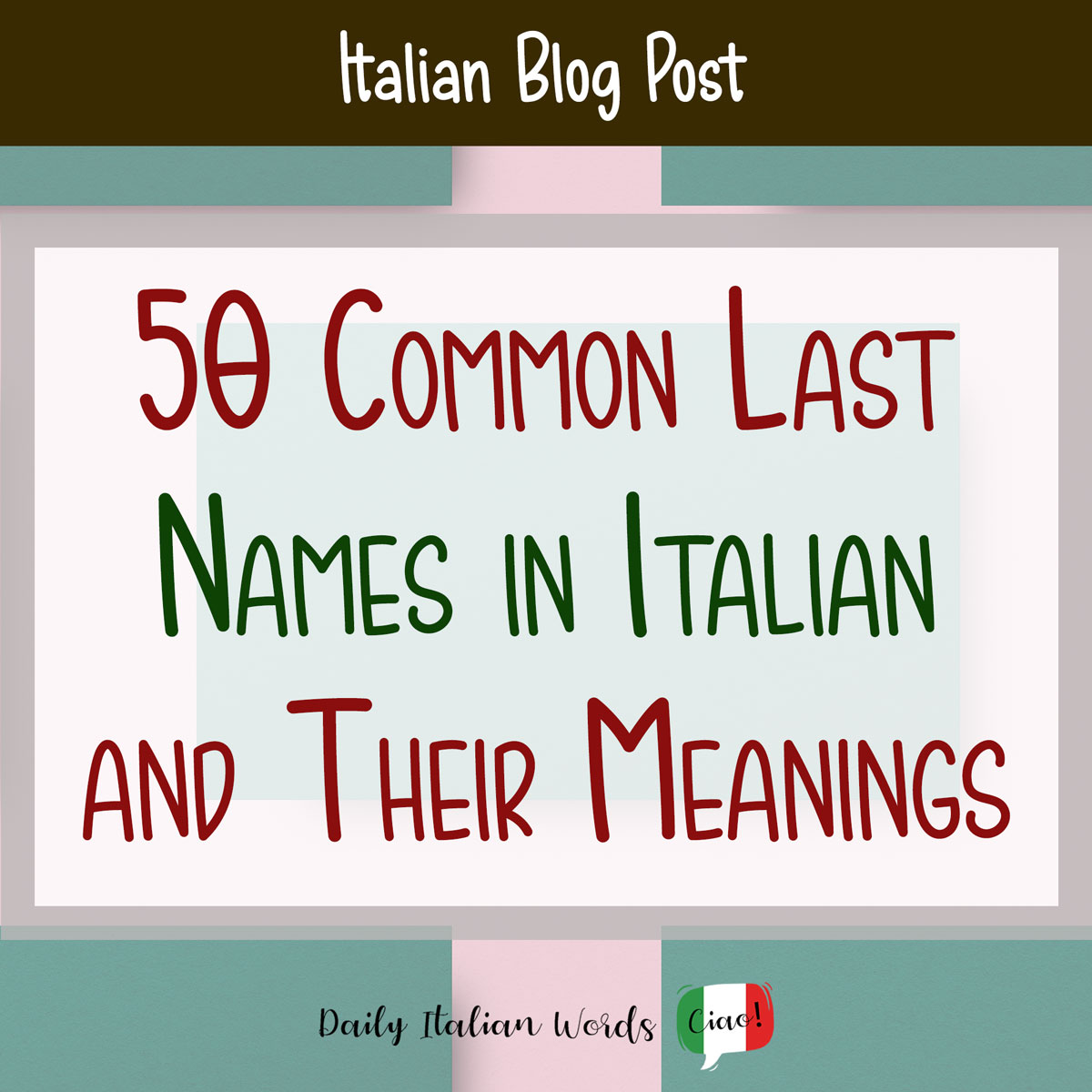Italian Last Names - Meanings, Origins, And More
Have you ever stopped to think about the stories held within family names? When we talk about Italian last names, it's almost like opening a window into a rich cultural past, a way of looking at generations of history, and the very fabric of life in Italy. These names, you see, are more than just labels; they are little pieces of identity that have traveled through time, carrying echoes of places, jobs, or even personal quirks from long ago.
This particular collection of information, which comes from "My text", helps us get a good sense of the many different Italian last names out there. We're going to explore not just the ones you hear all the time, but also some truly special ones, the kind that might make you pause and wonder. It's about figuring out what these names mean and where they came from, giving you a fuller picture of how they fit into the bigger picture of Italian life.
Our little adventure into Italian last names pulls together details from sources like surnam.es, which is a big database of family names. Whether you have a deep love for Italian cooking, a family connection to the country, or just a general admiration for Italian art and stories, this look at these names will, in a way, give you something to think about and enjoy. We’re aiming to give you a good idea of what’s out there.
Table of Contents
- What Makes Italian Last Names So Special?
- How Did Italian Last Names Get Their Start?
- Are There Common Italian Last Names We Should Know?
- What About Unique Italian Last Names?
- A Look at the Most Popular Italian Last Names
- Exploring Italian Last Names by Region
- Famous Italian Last Names You Might Recognize
- Finding Your Own Italian Last Name's Story
- A Quick Look Back at Italian Last Names
What Makes Italian Last Names So Special?
You might wonder what it is about Italian last names that makes them stand out, and really, it's their ability to tell a tale. They often paint a picture of a person's roots, their family's work, or even a noticeable personal feature from way back when. For instance, a name could come from a place where someone lived, like a town or a certain kind of landscape feature. Or, it could point to a job someone held, like someone who worked with wood or perhaps a person who looked after animals. It’s quite interesting, actually, how these names can carry so much information about a family's past without saying much at all.
The sounds of these names, too, are often quite pleasing to the ear. Many Italian last names seem to just flow off the tongue, a bit like a piece of music or a line of poetry. This musical quality is something people often appreciate, whether they are familiar with the language or not. It’s part of what gives them their particular charm. So, in a way, these names are not just about identity; they also have a certain aesthetic appeal that many people find quite lovely.
This quality of sounding nice, combined with the stories they hold, makes exploring Italian last names a rather engaging activity. It’s like putting together pieces of a puzzle, where each name offers a hint about a family’s journey through the ages. You know, it’s quite something to think about how a simple name can hold so much history and character, truly a testament to the culture from which they spring.
How Did Italian Last Names Get Their Start?
Many Italian last names, you see, have beginnings that are quite practical. They often came from things people did for a living, a personal characteristic, or even the place where someone made their home. For example, if someone was a baker, their family might have taken on a name related to that profession. Or, if they were known for having a certain kind of hair or a particular build, a name might have developed from that physical trait. It’s a pretty straightforward way, actually, for names to come into being.
Then there are those Italian last names that are simply based on personal names, perhaps the name of a father or an important ancestor. This practice of using a given name as a family name is quite common across many cultures, and Italy is no exception. It’s a way of showing lineage, of saying, "This is so-and-so's family." You can find many examples of this, where a popular first name from generations ago became a family's lasting identifier. It just goes to show how personal connections played a role in naming conventions.
A good example of how names come about is the name Colombo. This name, as a matter of fact, could come from the Italian word "colomba," which means "dove." So, it might have been given to someone who cared for doves, or perhaps it simply came from the given name "Colombo," which itself comes from that same word. This sort of double origin is not at all uncommon, and it makes the background of Italian last names even more interesting. It really highlights how much variety there is in their beginnings.
Are There Common Italian Last Names We Should Know?
Yes, there are definitely some Italian last names that you’ll come across more often than others. Just like in any country, some family names have become very widespread over time. These are the names that have been passed down through many, many generations, and you can find them in various parts of Italy and among people of Italian heritage all over the world. Knowing these more common names can be a good starting point if you're trying to get a feel for Italian naming traditions. It’s like getting to know the most popular tunes before you explore the whole album, so to speak.
According to information from "My text," which pulled data from surnam.es, a place that keeps track of family names, there’s a list of the 50 most common Italian last names as of September 2023. This list gives us a good snapshot of what names are currently very prevalent. It's interesting to see which names have maintained their popularity over time and which ones are most frequently encountered today. This kind of information can be quite helpful for anyone curious about the general landscape of Italian family names, really.
When you look at a list like this, you might notice patterns or perhaps even recognize some names that you've heard before. It’s a way of seeing the names that have truly taken root and spread widely. These common Italian last names often have straightforward meanings or very clear origins, which might contribute to their widespread use. They are, in a way, the backbone of the Italian naming system, showing us the most frequently repeated threads in the tapestry of Italian families.
What About Unique Italian Last Names?
While the common names are interesting, there's also a whole other side to Italian last names: the unique ones, the ones that are a bit more rare, or those that just sound particularly appealing. These are the names that might not pop up as often, but when they do, they often carry a special kind of charm or a very specific history. Sometimes, these names are tied to a very particular small town, a unique family story, or perhaps a characteristic that was not widespread. It’s quite fun, honestly, to stumble upon one of these less common names.
The "My text" information also talks about finding beautiful Italian surnames, rare Italian last names, and what are described as "cool" Italian surnames that, as it says, "roll off the tongue like poetry." This really speaks to the aesthetic quality of these names. Some names just have a wonderful rhythm and sound, making them a joy to say and hear. These are the names that often leave a lasting impression because of their distinctiveness and the way they feel when spoken. It’s almost like they have a certain lyrical quality to them.
For someone looking for something a little different, or if you're just enjoying the vast collection of Italian last names, these unique and rare options are certainly worth considering. They show the incredible range and creativity that can be found within Italian naming traditions. They are a reminder that while some names are everywhere, there are still plenty of hidden gems waiting to be discovered, each with its own special flair. You know, it’s a pretty vast collection to explore.
A Look at the Most Popular Italian Last Names
When we talk about popular Italian last names, we’re really looking at the ones that have gained a lot of recognition, either because they are very common or because they belong to well-known figures. The "My text" information points to a list of the 100 most common Italian last names and their meanings. This larger list gives an even broader view of the names that people are most likely to encounter. It’s a good way to see which names have truly stood the test of time and spread widely across the country and beyond.
Understanding the meanings behind these popular names can be quite enlightening. It helps to connect the name to its original purpose or the story it once told. For instance, a name might mean "blacksmith" or "little hill," giving you a direct link to a past occupation or a geographical feature. This deepens your appreciation for the name itself and the history it represents. So, you know, it’s not just about the sound of the name, but the story it carries within it.
Beyond just the commonness, there’s also the idea of "elite" last names mentioned in "My text," which suggests names that might be associated with particular historical families or have a certain social standing. This adds another layer to the discussion of popular names, showing that popularity can come from various sources, not just sheer numbers. It really highlights the diverse reasons why certain Italian last names become well-known or highly regarded.
Exploring Italian Last Names by Region
One of the truly fascinating things about Italian last names is how they can differ from one region of Italy to another. The "My text" information encourages us to explore the popular surnames in each region and their origins. This is because Italy, as a country, has a very long and distinct history, with different areas having their own dialects, customs, and historical influences. These regional differences often show up in the family names that are most common in those specific places.
For instance, a name that is very common in the north might be quite rare in the south, and vice versa. This can be due to historical migrations, local industries, or even the influence of different ruling powers over the centuries. It's like each region has its own unique set of naming traditions that have evolved over a very long period. This regional variation makes the study of Italian last names even more engaging, as it adds another dimension to their stories. It really shows how diverse the country is.
Looking at names region by region helps you see how geography and local history have shaped naming patterns. If you have a family connection to a specific part of Italy, investigating the names popular in that area can give you a deeper connection to your own roots. It’s a pretty neat way to understand how families spread out and how names became associated with certain places. So, you know, it’s a good way to connect with the past.
Famous Italian Last Names You Might Recognize
As you go through a list of Italian last names, you might find yourself recognizing some names that belong to very well-known people. The "My text" information specifically mentions that you may recognize famous Italian last names such as Tarantino, Da Vinci, Valentino, and Vivaldi. These names, of course, are connected to individuals who have made significant contributions in various fields, from art and science to film and music. Their fame helps to make their last names familiar to many people around the world.
Seeing these famous names on a list of common or notable Italian last names can be a fun little discovery. It connects the historical and cultural significance of these names to figures who are part of our shared cultural memory. It shows how a name can become famous not just because it's widely used, but because it's carried by someone who has achieved great things. It’s a way of seeing the names come alive, in a way, through the people who bore them.
These famous Italian last names often carry a certain weight or prestige because of the achievements associated with them. They remind us that names are not just about personal identity, but also about legacy and the impact individuals have on the world. So, when you come across a name like Da Vinci, it’s not just a surname; it’s a symbol of artistic and intellectual genius that has echoed through the centuries. It’s quite something to think about, really, the power of a name.
Finding Your Own Italian Last Name's Story
For many people, discovering the meaning and origin of their own Italian surname is a very personal and rewarding pursuit. The "My text" encourages this, inviting you to discover the meaning and origin of your Italian surname. It’s a way of connecting with your family's past, understanding where your ancestors might have come from, and learning about the circumstances that led to your family name being what it is today. This kind of personal exploration can be very meaningful, truly.
If you have Italian heritage, looking into your last name can provide insights into your family's specific history. It might reveal details about a profession your ancestors held, a place they lived, or even a personal characteristic that was passed down. This journey of discovery can feel like putting together pieces of a family puzzle, giving you a clearer picture of your roots. It’s a pretty direct way to feel closer to those who came before you, you know.
To help with this, there are comprehensive lists of Italian surnames available, like the one mentioned in "My text," which invites you to explore it and learn about their fascinating history. These resources are designed to help you trace back your name's story, offering details about its meaning, its earliest known uses, and how it might have changed over time. It’s a good tool for anyone who wants to dig a little deeper into their own family's unique tale. You might just find something surprising.
A Quick Look Back at Italian Last Names
We've taken a little tour through the vast collection of Italian last names, from the ones you hear all the time to those that are a bit more rare and unique. We’ve seen how these names can come from professions, personal names, physical traits, or even specific locations in Italy. It’s clear that each name, in its own way, carries a piece of history and a story waiting to be told. The information we pulled from "My text" truly shows the wide range of names available to explore.
We touched upon the 50 most common Italian last names as of September 2023, and also looked at a larger list of 100 names and their meanings. We even considered the idea of finding the longest, the funniest, and the most elite last names, showing the sheer variety that exists. The idea that you can explore popular surnames in each region of Italy and their origins also highlights how diverse naming practices can be within the country itself.
And, of course, we acknowledged those beautiful Italian surnames, the rare ones, and the "cool" ones that just sound wonderful when spoken. We also noted how you might recognize famous Italian last names like Tarantino, Da Vinci, Valentino, and Vivaldi, connecting these names to well-known figures. This entire discussion, in essence, provides a good starting point for anyone wanting to learn more about Italian last names and their rich backgrounds. It’s quite a comprehensive picture, really.

71 Badass Italian Last Names (With Meanings)

The 50 Most Common Italian Last Names (And Their Meanings) - Daily

Most Common Surnames in Italy By Region - Brilliant Maps